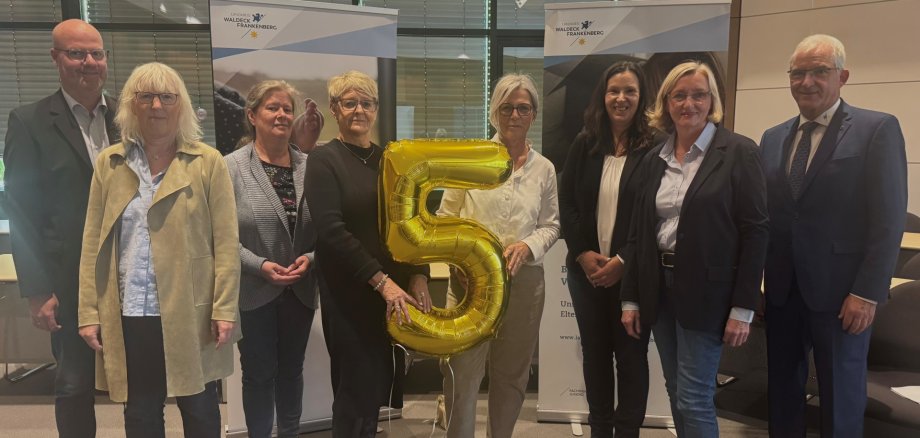Making the start of life easier: Babylotse programme turns five
Before the birth, during the hospital stay or even after discharge, parents are often faced with many challenges and numerous questions. Pregnant women, mothers and fathers or single parents can turn to the baby guides at Korbach City Hospital or Frankenberg District Hospital for support. Together with the district of Waldeck-Frankenberg, they implement the Baby Guide programme, which is already five years old this year.
"The programme is an important part of our healthcare provision and shows how targeted and sustainable support can be created for young families," says Karl-Friedrich Frese, First District Councillor of the Waldeck-Frankenberg district. "It offers a valuable resource for parents who are confronted with countless questions and challenges before, during and after the birth of their child - and has been doing so for five years now." To mark this anniversary, the baby guides from Korbach and Frankenberg, Marion Finger and Sabine Guaglianone-Hesse, report on their work and special experiences relating to their activities.
The Babylotse programme is celebrating its fifth anniversary this year. How has the programme developed during this time?
Sabine Guaglianone-Hesse: "The service was launched in March 2020 - during the coronavirus pandemic and therefore under difficult conditions. In the meantime, the counselling provided by the baby guides has become an integrated and established component of the clinics. Our level of awareness is increasing from year to year - and with it the number of consultations. In 2024, it was more than 300 consultations per year. We see a very positive effect here. Incidentally, this is also shown by scientific studies that have investigated the effects of counselling services on maternity wards."
Can you explain to us what exactly a baby guide does and who can make use of your support?
Marion Finger: "We baby guides offer a low-threshold, psychosocial counselling service for new parents - and thus complement the medical services offered by the hospitals. Most often, this involves finding a midwife, finding a paediatrician or support with applications for family benefits such as parental and child benefits. But we also help with structuring the first time at home after the birth and how the young families can reorganise their everyday lives."
How does the co-operation with other services or service providers work? Can you outline an example of a successful placement?
Sabine Guaglianone-Hesse: "Gladly. For example, we had a case in which a young single mother, who was very insecure and anxious, needed support in caring for and looking after her first child. As baby guides, we put her in touch with the district's early help health professionals. We then had a conversation with the new mum to discuss what exactly she needed support with and how much. Together with her, the support needs were identified and contacts were made. The young mother was very grateful for this kind of support."
So your offer is well received.
Marion Finger: "Yes, indeed. We are on site at the hospitals three days a week. And if we're not there and parents need us, the nursing staff contact us. We are on site both during the week and, if necessary, on Saturdays and by appointment, so that as many families as possible who want our support receive it before they are discharged from hospital. And: Families who have given birth in another hospital with an affiliated paediatric clinic for health reasons and who live in Waldeck-Frankenberg can also make use of our counselling services outside the clinic. We are delighted that parents and midwives recommend us time and again. Above all, however, the gratitude that many families show us - through conversations, phone calls, emails or other gestures - is a great affirmation of our work and motivates us every day anew."
Background:
The Babylotse programme is run by the district of Waldeck-Frankenberg in cooperation with Hessenklinik Stadtkrankenhaus Korbach and Kreiskrankenhaus Frankenberg as well as the SeeYou Family-Oriented Aftercare Hamburg Foundation. It is financially supported by the state of Hesse and can be used free of charge by families from Waldeck-Frankenberg.
The baby counsellor Marion Finger at Korbach City Hospital offers her consultation hours on Monday and Wednesday afternoons from 2.15 to 5.15 pm - or by prior appointment. She can be contacted on 05631-569 386 or by e-mail.
Baby counsellor Sabine Guaglianone-Hesse at Frankenberg District Hospital offers her consultation hours on Monday and Wednesday afternoons from 2 to 5 p.m. - or by prior appointment. She can be contacted on 06451-551 659 or by e-mail.
Caption: The Babylotse programme is five years old: Also present were the head of the Youth Department at the district authority Andreas Strake, the state coordinator for early help in Hesse Sabine Stahl, the head midwife at Korbach City Hospital Irene Rudersdorf-Wilke, the baby guide at Frankenberg District Hospital Sabine Guaglianone-Hesse, Marion Finger, the baby guide at Korbach City Hospital, Bettina Götz, the network coordinator for early help in Waldeck-Frankenberg, Gabriele Schalk, the head gynaecologist at Frankenberg District Hospital, and Karl-Friedrich Frese, the first district councillor of the district. (Photo: District of Waldeck-Frankenberg)
